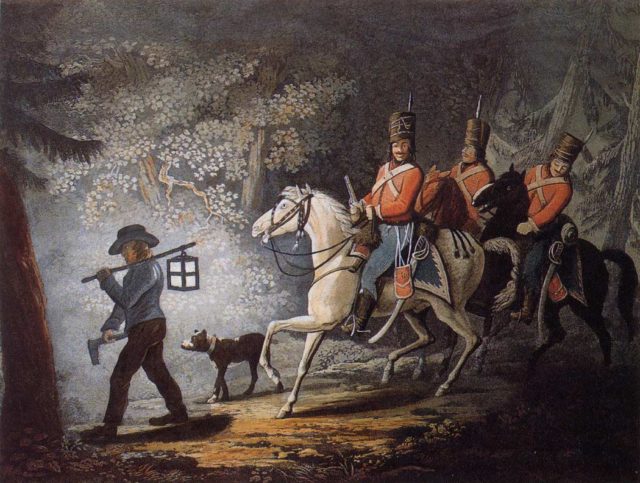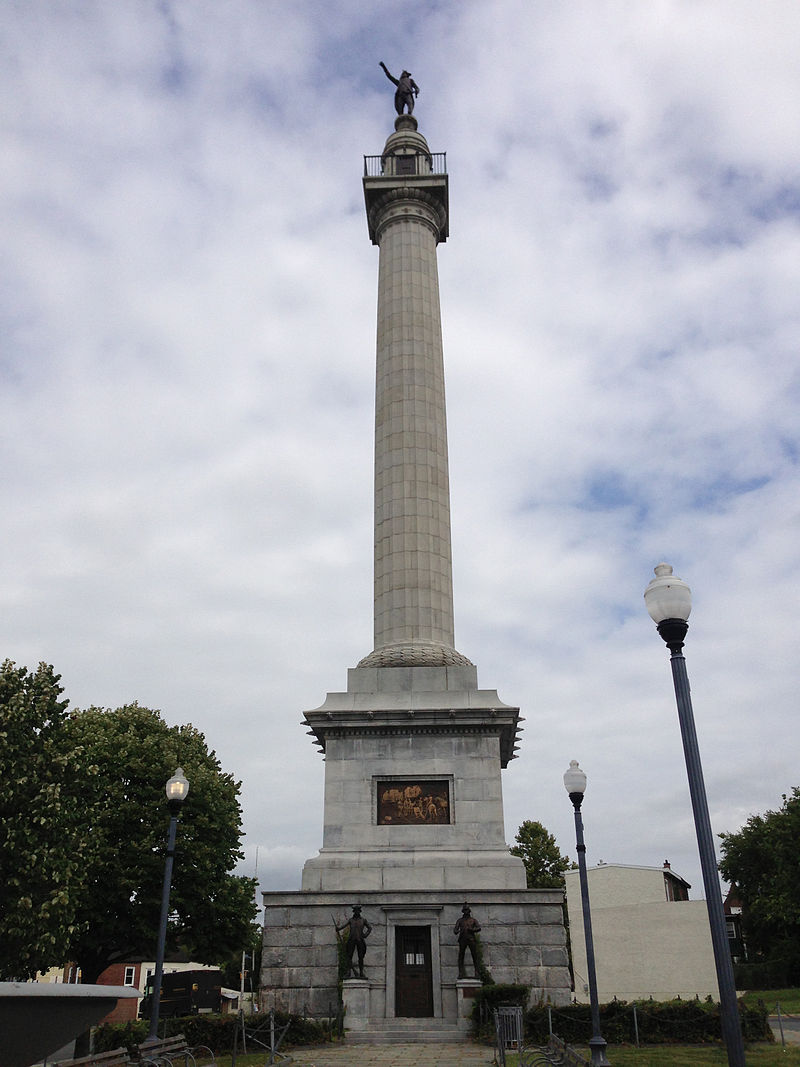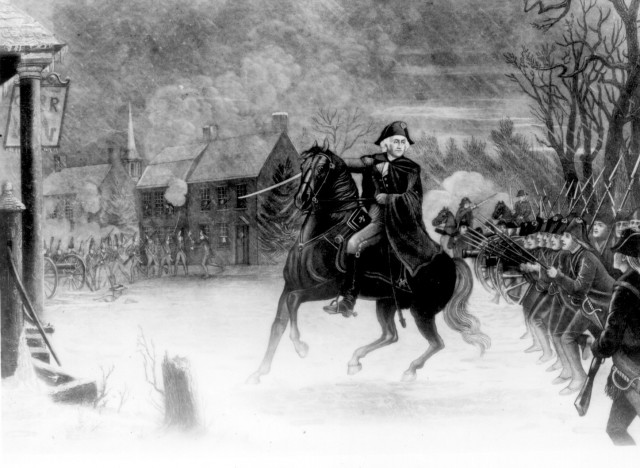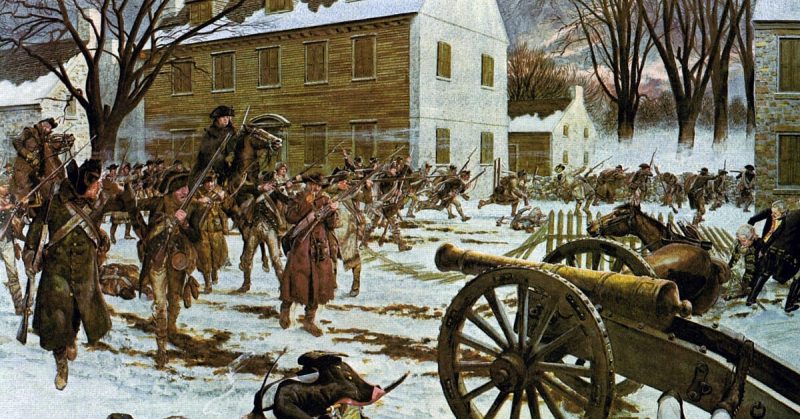Fought on 26 December 1776, the Battle of Trenton was a small but significant battle in the American Revolution. At a time when the forces of independence were on the retreat, it helped to restore morale and faith in the revolutionary cause. A large part of the reason for the American success was the winter.
Time to Hibernate
The was not going well for the American colonies. They had suffered several defeats and Washington was forced to move his forces during the depths of Winter, which was contrary to all military thinking, at the time. Throughout the history of warfare, winter has tended to be a time of consolidation and recuperation rather than advance.Winter was a terrible time to be on the march in the colonies, with ice on the rivers and snow covering the ground. With Christmas in sight, few of the men can have wanted to be bearing arms rather than back home in the arms of their loved ones.
Small wonder then that British commander Sir William Howe had sent his troops into winter quarters, rather than send them out into the bitter cold. He would have expected his opponents, smarting from defeats at Fort Lee and Fort Washington, to do the same.
Like a great bear, the British were preparing to hibernate.
Colonel Rall’s Hessians

Among the forces settling down to wait out the winter were the Hessians at Trenton, New Jersey. These German mercenaries had often proven a fearsome addition to the British forces, but for now, they wanted to stay warm and dry and to enjoy a festive drink or three.
The Hessians were led by Colonel Johann Gotlieb Rall. To Rall, image was an important part of military discipline, and his image was one of confidence. His desire not to be seen as weak or intimidated by the colonials overstepped the line from inspiring to over-confidence. He would not admit in front of his men, but he informed his superiors – that Americans raids led him to believe that Trenton might be attacked. Without expressing these concerns he could not fortify the town, never mind ensure his men were in a state of preparedness.
Always a man who liked to stay up late drinking and rise late for a hot bath, Rall celebrated Christmas 1776 in his traditional style – drinking and gambling into the night.
The Complicated George Washington

What Rall feared but could not admit was true – the Americans were coming, and they were led by a commander who remains the most famous in his nation’s entire history – General George Washington.
Washington was a man who liked to analyze and plan. He favored complex and clever-sounding tactics, and at Trenton, this almost became his downfall.
To ensure a morale-boosting victory, and prevent the Hessian’s escaping, Washington wanted to achieve two things at Trenton – to surround the enemy, and to surprise them. To this end, he divided his troops into three formations, who would march on Trenton under cover of the night of 25 December. They would then attack the enemy all at once, ensuring tactical advantage and cutting off the British force’s escape route. It was a plan that looked great on paper! However, the reality of the situation was not suitable for Washington’s tactics.
The reality for an 18th-century army was that it was hard to coordinate separate formations over a distance, doubly so in darkness and with winter conditions hindering their movements. And so it was that, when Washington attacked, two out of three formations were not in position.
A Dawn Surprise
Though the plan may not have gone perfectly, it achieved its aims, in particular, the element of surprise. This was as much down to Hessian failings as colonial cunning.
Rall, given a note the previous day predicting an American attack, had stuffed it unopened into his pocket. Meanwhile, his second-in-command, Major von Dechow, had canceled the dawn patrol for 26 December.
It was Christmas, bitterly cold out, and he did not expect trouble from the Americans under such circumstances.

The first the Hessians knew of the attack was when the Americans assaulted an outpost a mile from town. Soon messengers were rushing to rouse Rall and gather the defenders. While the Hessians struggled into action, the American formations approached the town, cutting off escape routes and bringing up their cannon to bombard Hessian troops.
With cannon at the heads of both main roads and other artillery firing from across the river, the Americans quickly broke the Hessian formations and gained control of much of Trenton. Buildings gave them defensive cover, and sympathetic civilians came to their aid.
A Heartening Victory
Rall made one final attempt to break out of the trap. With pipes and drums playing, he led his men toward the American flank on hills north of Trenton. On the heights, Washington saw the Hessians coming and formed his men up ready.
The mercenaries marched into withering fire that fell on them from three directions at once. Rall was fatally wounded, and his men broke for the final time. 22 were killed and 83 wounded, but more significantly, 896 were captured.
The Americans lost only five men wounded in the battle, and two dead from frostbite. They had taken out the entire Hessian force with almost no losses and added to their own arms and supplies with those taken from the Germans.
Perhaps more significantly, Trenton provided the Americans with a much-needed psychological boost. Morale and recruitment lifted once more while the stunned Howe struggled to come to terms with the apparent turnaround. By making winter his ally, George Washington had saved the struggling Revolution. It would take several more years for the British to learn to respect their foes.
Sources:
- Mike Duncan (2014), Revolutions Podcast.
- Geoffrey Regan (1991), The Guinness Book of Military Blunders.
